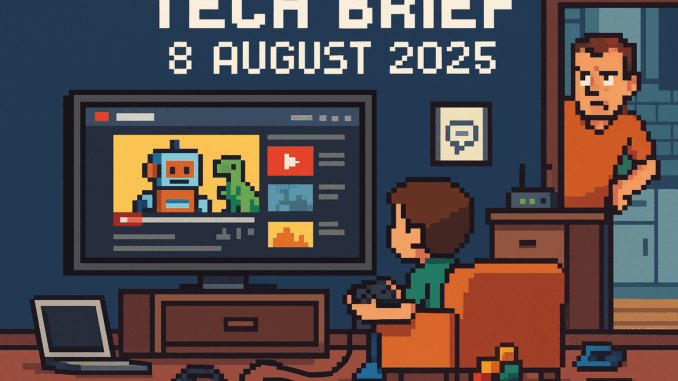
Tech Brief 8 August 2025 asks a very current question for anyone who grew up untangling cables, not YouTube playlists: What would you do if your family’s television habits could not be tamed by a timer switch or a huffy shout from the kitchen? Missed yesterday’s Tech Brief? Catch up here before diving in.
YouTube’s Grip on Families: Parents Sound Off
“They’re never really watching what you think they are.” That thought nags thousands of parents who once swapped tapes and now watch their children inhabit a world shaped by YouTube’s infinite feed. The platform, accused of making content control impossible, is under renewed scrutiny as Australia proposes a ban for users under sixteen. The story from The Guardian gathers first-hand reports: some parents consider YouTube an educational lifeline, others worry about rabbit holes that begin with innocent toy reviews and end somewhere darker.
Today’s parents rationed “TV time” by the hour, but that strategy sounds almost quaint beside algorithmic curation. Manuals once offered button-by-button guides for safeguarding viewing. Now, it takes a crash course in digital literacy simply to outpace your child’s next keyword search. If you ever programmed a VCR for a sibling, you might feel oddly prepared. You won’t find any guarantees, though.
Playing Forever: Why Nobody Really “Grows Out” of Games
How old is too old for games journalism? Veteran writer Keith Stuart says there is no upper limit. In this personal account, Stuart details decades spent surrounded by consoles and code, resisting any pressure to abandon games for more “grown-up” pursuits. That feeling, your imagination refusing to pack it in just because you add another candle to the cake, will ring true for many Netscape Nation readers.
He acknowledges readers who drifted away from midnight demo parties or tape trading, but never lost the need for play or discovery. Magazines in the eighties warned the industry was a passing phase. Decades later, communities endure, mature, and even re-emerge, still tinkering, reviewing, and finding new games to love. Will you pack away your last joystick for good? Not likely. Let’s see whose hands are still steady in retirement.
Britain Turns to Innovation to Curb Home Energy Costs
Cold fact: Household energy costs are still rising, and the Government’s chief scientific advisor, Sir Patrick Vallance, has backed a £4 million, five-year prize competition for tech companies. Solutions range from AI tools to forecast demand, to smarter systems for heating your flat, to trialling electric cars as grid-scale batteries. The main challenge is to shift two gigawatts of peak load and drive real savings for homes.
Britain’s flirtation with big tech fixes is hardly new, from transistor radios during the Three-Day Week to the nascent energy efficiency stickers in late-nineties school ICT suites. This time, the hope is that home-grown software can teach your old kit new tricks or help your parked car power the street next door. Grumbling about the “white meter” in your parents’ airing cupboard might leave you oddly well prepared for today’s grid games. Control isn’t what it used to be, but a good tool in the right hands has not lost its charm.
US Federal Courts Face Persistent Cyberattacks
A new week, another grim update from the intersection of law and IT. The Administrative Office of the US Courts confirmed their networks remain targeted by sophisticated cyberattacks. No outages so far, but the mood among legal and security staff is tense. Court systems still run on technology that would look at home beside a beige IBM in a retro computing bench, critical records managed by software many decades old.
If you watched your first “hacker” movie on VHS and your first password was scribbled into a diary, this is where fantasy collides with reality. Could a forty-year-old COBOL program be the weak link? Someone, somewhere, is paid very well to answer that. As we saw earlier with control and improvisation in family tech, even the oldest systems are not immune to today’s disruptions.
From the Wayback Machine
On This Day: 1964 – IBM announced the System/360 mainframe family, credited to the minds led by Gene Amdahl. The System/360’s 8-bit byte and the launch of a shared software platform introduced compatibility in big computing years before home computers entered British living rooms. With six models and fifty-four peripherals, the line let businesses expand as they grew, rather than swapping out hardware completely. Just as the System/360 promised harmony in the chaos of early computing, we still chase coherence in today’s sprawling patchwork of technology and standards.
This Stuck With Me
Will parental boundaries, energy controls, or digital security ever be straightforward again? After writing Tech Brief 8 August 2025, I doubt it. If one fix from the past could short-circuit the latest challenge, we would all have neater kit shelves. In the meantime, research, improv, and asking kids for login help works as well as anything.
Keep your curiosity live, toolkit in reach, and patience for both passwords and people.
Missed yesterday’s Tech Brief? Catch up here

Leave a Reply